The Cosambesti locality in the Ialomita County has been waiting for the unseen enemy in the past two days. The water, dishonest and flippant as it is, postpones its attack from one day to the other. The villagers are waiting to fight with the water scared and with the bags in their yards.
The Cosambesti village, only a few kilometers away from Slobozia, has entered the recent history of the floods in Romania, due to the visits of several dignitaries. On Sunday, the villagers looked towards the sky twice to see the official helicopters.
The country is observed better from the sky, the leaders say. The first one that came down from up high into the desperate heart of Baragan was Sulfina Barbu, the minister of Environment. In order to make the people see the mobilization of the authorities, and trying to score at least one goal in the match against the floods, the Minister of Environment was announcing on a TV show live from the City Hall in Cosambesti that the great confrontation with the water would take place that day. At about 10 oâclock in the eveningâ¦
CAME, SAW, LEFT
After a short time, a second helicopter landed in the village. The President came out and wanted to take a bath in the crowd. There was a lot of handshaking, he greeted the people, laughed a little and, as a President that he is, he left with the same helicopter to some cleaner and dryer areas.
In the same day, on the news bulletins in the evening, the TV stations were broadcasting terrifying images. 1,000 soldiers were building barrages made of sand bags, 16 amphibian tanks were preparing to evacuate the people, tens of military cars, excavators and dump trucks. We got into the car and left to meet the floods.
On the road connecting Ciulnita and Slobozia, right before the bridge, you make a turn to the right and get to Bora. The first village under an imminent threat.
The Slobozia cemetery is at the entrance, and a lot of people are alongside the road that crosses the village. It is a few minutes past 10 oâclock, but it seems like the noon of a day with religious significance. The villagers attentively look to all the cars waiting for a sign, some news, something to announce the arrival of the water.
WAITING FOR THE DISASTER
The people arenât sleeping in Cosambesti either. How could one be sleeping knowing that the water is about to hit? The despair of the ones that wait with all their papers in plastic bags, ready to run away from the water, leaving aside their lifelong work, is as great as the one of the people that have already lost everythingâ¦
Cosambesti is right on the bank of Ialomita. There is no sign of amphibian-tanks near the barrage made of sand bags and dirt gathered by the excavators. Three hours ago, their image was announcing the disaster that was to come. Had they been brought here only for show? Approximately 30 tired and dirty soldiers were carrying bags to get the barrage higher. They had come from Bucharest. "Around midnight (the night between Saturday and Sunday - n.e.), the general alarm sounded. We got into the cars and we were brought in Ialomita. Why didnât they bring the soldiers from this county?" Because the military unit in Slobozia has been disabled, because there are no more recruits, because we are in a process of privatizationâ¦
The army men work in shifts and sleep in the trucks that had brought them. The water is late. At about midnight, we find out that there is a breach in the Ialomita River, at Perieti (another village close to Slobozia), where two hectares of woods had been flooded.
GUESSING
The Gimbasani village is the last one in the list of the ones that are to be flooded, according to Sulfina Barbuâs predictions. There is a barrage built here, but there is no sign of soldiers that should check the water level or alert the people in
case of any danger. Some villagers come to see the evolution of the riverâs level. Many of them have already run away from the waters on the nearby hills.
Vasilica harnessed her skinny horse, got a few clothes and her 5-year-old kid covered with a blanket and a plastic piece and climbed up the hill. Her house is at the edge of the village right on the bank of the water. "I leave God to decide about the lives of the animals", Vasilica says and sighs. She took all her children with her, her little boy and her two daughters, who sit on the side of the cart on guard.
She is not the only person that left the village. Some neighbors got their pig in the trunk of the car and the chickens on the back seats and ran away from the water. Somewhere around 10 oâclock in the evening, the vice-mayor in Gimbasani climbed up the hill to tell them to get back because the danger had gone. And, when the people in the village were relieved, a new "Sulfina Barbu" warning appears: "the Ialomita river crest stage will be reached today (on Monday - n.e.) at 12 oâclock".
VISITS AND DISAPPOINTMENTS
Monday morning. The Cosambesti barrage is fastened. The soldiers, spread on the top of the earthwork, are carrying big stones with their spades or bare hands. They are tired, but there are no complaints. It is past 12 oâclock and the water fails to get to this meeting too. This is the flood with a schedule of a soap opera in which everyone wants to be the hero. At 2 oâclock in the afternoon, instead of the water, Prime Minister Tariceanu visits the villagers. He came by car, because the helicopter had landed on the soccer field in Slobozia. The chief of the Government, as well as Internal Affairs Minister Vasile Blaga, are wearing shoes. This is a good sign saying the water isnât coming to soon since it wouldnât dare to wet the ankles of the dignitaries from the Victoria Palace. The Prime Minister climbs up the barrage, hears the report of the chief of the Guard Regiment, followed by the one of the director from the Romanian Waters.
The latter assures the Prime Minister the danger is far. However, the computations made in Bucharest donât match the ones in Cosambesti, because Tariceanu was stating to the media, after getting down from the barrage, that the "danger is on until tonight. It is better for the people to worry, because the water might come and catch them off-hand", he adds. He gets into the car and goes to Gimbasani, the neighbor village. He doesnât stay there for a long time. There were only 20 villagers who were fighting with the sand bags trying to build up the barrage. Tariceanu only looks to the water and gets back into the car leaving the wondered villagers who were waiting at least some encouragement.
The Chief Inspector of the Romanian Gendarmerie stays here and encourages the villagers: "Be calm because there are no threats. You should blame me if anything happens". In the meantime, the news bulletins announce the arrival of the big wave. Between 2 and 4 oâclock. Damb this flood! It is so bombastic, dishonest and inconstant like a politician in an electoral campaignâ¦



















